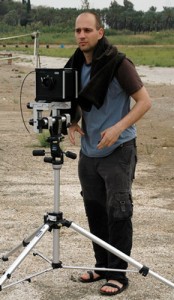Oded Hirsch | Video Artist
 On the kibbutz where Israeli-born video artist Oded Hirsch grew up, there is almost always a ready-made cast of family and friends excited to star in his work.
On the kibbutz where Israeli-born video artist Oded Hirsch grew up, there is almost always a ready-made cast of family and friends excited to star in his work.
For his first major piece, 50 Blue, half a dozen men from the kibbutz—a collective living community in Israel — volunteered to hoist Hirsch’s father in his wheelchair up to a watchtower while standing in the Sea of Galilee in the rain.
“I was surprised because people really came to me and said ‘we want to be part of it,’” he says.
The haunting 50 Blue is the first in a trilogy; the second piece, Tochka, depicts an assembly line of men building a bridge. Hirsch worked on the third as a 2011-2012 fellow for the Six Point Fellowship, which supports artists exploring Jewish ideas.
There is Nothing New shows dozens of people from the kibbutz where he grew up rescuing a person whose parachute is tangled in power lines; the rescuers go to great lengths to get the man down, when the problem could be solved with a tall ladder.
There is Nothing New will show dozens of people from the kibbutz where he grew up rescuing a person whose parachute is tangled in power lines; the rescuers will go to great lengths to get the man down, when the problem could be solved with a tall ladder.
Hirsch says this trilogy examines the absurdity of ideology and collective thinking. While he says he loved growing up on the idyllic kibbutz, the movement also demands scrutiny.
However, he stresses his work is not political.
“Before people know I’m Israeli, they see my work as a personal struggle. Once they know I’m Israeli, they think of more in political terms,” he says, adding that the “political context is present, but it’s secondary for me.”
Hirsch earned his undergraduate degree at the Academy of Design in Haifa, Israel, where he had heard about Pratt from one of his professors, a Pratt Institute graduate.
After completing his undergraduate degree, Hirsch was ready for a change.
“When I graduated from undergraduate I said to myself ‘where is the city with the most vivid cultural scene?’ It wasn’t much of a question.”
Hirsch moved to the U.S. to study fine art at Pratt Institute. Trained as a photographer, he soon began exploring video art.
“I am a storyteller,” he says. “I am a photographer first, but photography is limiting if you try to tell stories. Then I discovered the medium of video.”
Now, Hirsch divides his time between his studio in Long Island City, and working at Fashion Institute of Technology. He is also represented by the Thierry Goldberg Projects gallery on the Lower East Side, where he showed a piece he shot on the kibbutz —a choreographed dance of excavators.
It turns out the kibbutz is the perfect setting for Hirsch’s work. “I like to make art with people,” he says, “making people join and work together and make a huge effort for the sake of making art together—no ideology, no financial reasons, just making art together.”